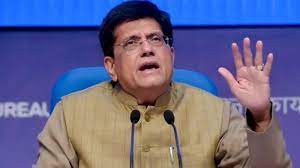NEW DELHI, Mar 12: Commerce and Industry minister Piyush Goyal has exuded confidence that during this fiscal, the country’s goods and services export numbers will be at the same level; as it was last year despite slowdown and uncertainties in the global trade.
He also said that the government measures such production-linked incentives schemes and focus on high-quality goods and services would help in containing the country’s trade deficit.
So our trade deficit will be significantly lower than last year.
“I am happy to share with you that we close the current year in March at the same level as last year. We have a little bit of an adjustment between goods and services, but collectively we will be at the same level as last year, which will be a very, very significant achievement given that most developing countries and less developed countries are seeing a fall in their international trade,” Goyal told PTI in an interview.
Cumulatively, the country’s merchandise exports in April-January 2023-24 contracted by 4.89 per cent to USD 353.92 billion. The estimated value of services exports during the ten-month period stood at USD 84.45 billion.
In 2022-23, India’s goods and services exports stood at USD 776 billion.
The war between Russia and Ukraine; Israel-Hamas is impacting global supply chains and the Red Sea crisis has led to significant increase in transportation costs and delay as Indian exporters have to send their consignments through the Cape of Good Hope, encircling Africa.
The minister said that India saw a scorching pace of growth in its international trade in the years between 2021 and 2023.
“We grew by 55 per cent over a period of two years, both in goods and in services’. It went up to USD 776 billion in only two years. And with growth on both goods and services, we could clearly see that this year is going to be one where we will have to consolidate the gains,” he said.
When asked if the government is thinking of extending some kind of support measures to exports to deal with the crisis, he said the approach of being dependent on the government to resolve all the problems is something that now Indian industry also does not really desire.
“We have been able to change the thinking to bring the confidence in the Indian exporters that we should stand on our own feet. We should not be dependent on the crutches of the government. And I’m glad to share with you that they do not want the crutches of support anymore.
“What we are doing is of course working through the military and the Navy to see that we can give protection to the ships traversing the Red Sea. We are also continuously in dialogue working with the countries in that region and with our own exporters, and very, very mindful and watchful of the situation,” he said.
When asked about the World Trade Organisation (WTO), the minister said it is “very” relevant and will continue to increase in its relevance as the world needs a rules-based trading system, which is transparent.
“The understanding that is gradually creeping in that we will not allow ourselves to make the same mistakes that countries made in the rural ground, for example, in agriculture,” he said.
Certain quarters of experts are of the view that the WTO is losing its relevance as the member countries are not able to reach consensus on key issues.
On March 1, the talks at the WTO’s ministerial conference ended with no decision on key issues such as finding a permanent solution to public food stockpile and on curbing fisheries subsidies, but the members agreed to further extend the moratorium on imposing import duties on e-commerce trade for two more years. (PTI)


